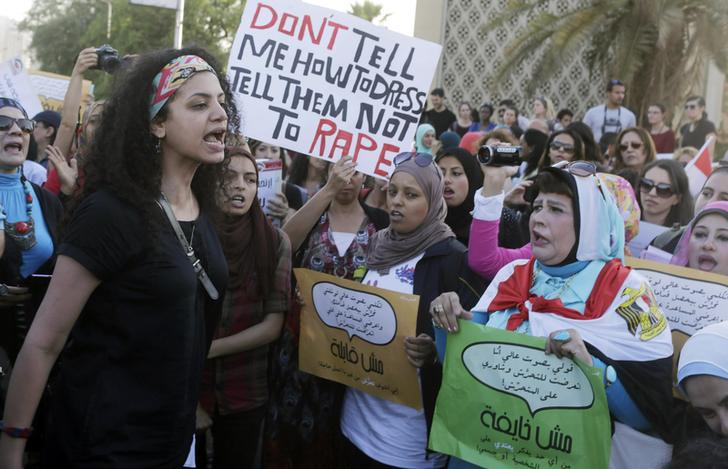Latest NEWS
- Aswat Masriya, the last word
- Roundup of Egypt's press headlines on March 15, 2017
- Roundup of Egypt's press headlines on March 14, 2017
- Former Egyptian President Hosni Mubarak to be released: lawyer
- Roundup of Egypt's press headlines on March 13, 2017
- Egypt's capital set to grow by half a million in 2017
- Egypt's wheat reserves to double with start of harvest -supply min
- Roundup of Egypt's press headlines on March 12, 2017
Token legal reforms fail to end violence against women in Egypt: report

Women chant slogans as they gather to protest against sexual harassment in front of the opera house in Cairo June 14, 2014. REUTERS/Asmaa Waguih
By Kieran Guilbert
LONDON (Thomson Reuters Foundation) - Token legal reforms have failed to end widespread public, domestic and state violence against women and girls in Egypt, who face sexual abuse, mob attacks, and torture in custody, a a rights group report said on Wednesday.
Despite recent initiatives, including a law criminalising sexual harassment, shortfalls in Egyptian law and a cycle of impunity for perpetrators mean that sexual and gender-based violence is still rife, Amnesty International said.
The report said the Egyptian authorities had failed to prevent, investigate and punish violence against women and girls, or provide victims with justice, compensation and support, including physical and psychological rehabilitation.
Women played a key role in the uprising that toppled Hosni Mubarak in 2011, but activists say the rising influence of Islamists, culminating in the election of Muslim Brotherhood leader Mohamed Mursi as president, was a major setback for women's rights.
"The reality is that women and girls in Egypt face the ever-present, lurking spectre of physical and sexual violence in all facets of life," said Hassiba Hadj Sahraoui, deputy director of the Middle East and North Africa programme at Amnesty.
"At home many are subjected to vicious beatings, aggression and abuse from spouses and relatives. In public they face incessant sexual harassment and the risk of mob attacks, when not falling prey to state officials' violence."
More than 99 percent of women and girls in Egypt reported being subjected to sexual harassment in a 2013 study by UN Women, and Amnesty said the number of sexual assaults in public had soared in recent years.
Sexual assaults and rapes have been carried out repeatedly in which women have been groped, stripped naked and dragged through the streets or beaten with sticks, knives and belts by violent mobs, the report said.
Many female prisoners, including pregnant women, told Amnesty that they had been assaulted, tortured and raped while in state custody.
The report also said that support for domestic abuse victims, who described how their spouses had beaten, whipped, burned and locked them up against their will, was non-existent.
Women who choose to report such treatment face a lack of interest from the security forces or prosecutors, and inadequate criminal laws, which do not explicitly criminalise domestic violence and marital rape.
Amnesty said the Egyptian authorities had responded to the violence simply by creating new institutions, at the expense of reforming existing laws, and by instructing law enforcement agencies and the courts not to tolerate violence against women.
Sahraoui called the measures largely symbolic, and urged the authorities to make sustained efforts to implement changes and "challenge deeply entrenched attitudes prevalent in Egyptian society".
Egypt was ranked as the worst country in the Arab world for women's rights in a 2013 poll by the Thomson Reuters Foundation.










